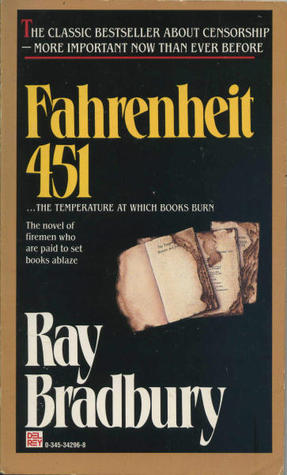 Summary:
Summary:The terrifyingly prophetic novel of a post-literate future.
Guy Montag is a fireman. His job is to burn books, which are forbidden, being the source of all discord and unhappiness. Even so, Montag is unhappy; there is discord in his marriage. Are books hidden in his house? The Mechanical Hound of the Fire Department, armed with a lethal hypodermic, escorted by helicopters, is ready to track down those dissidents who defy society to preserve and read books.
The classic dystopian novel of a post-literate future, Fahrenheit 451 stands alongside Orwell’s 1984 and Huxley’s Brave New World as a prophetic account of Western civilization’s enslavement by the media, drugs and conformity.
Bradbury’s powerful and poetic prose combines with uncanny insight into the potential of technology to create a novel which, decades on from first publication, still has the power to dazzle and shock. (from GoodReads)
Review:
I still can't believe it took me this long to read Fahrenheit 451! It's one of the classic dystopian novels and that's my favorite genre. While I enjoyed the message of Fahrenheit 451, I wasn't as enthralled by the execution as I thought I would be.
I've always loved the concept of this book: how firemen in the future start fires rather than put them out. That is just so clever. The theme of censorship is, of course, prevalent and I can't imagine a time when all books would be banned. How terrible would life be! And that's what Ray Bradbury describes in his novel. There is no substance in life anymore and all anyone cares about is the programs on TV. The internet wasn't around when this book was written, but that seems to be the tech-driven culture that Bradbury was describing. It was definitely scary that this could be our future someday.
The style of this book definitely wasn't my favorite. Ray Bradbury uses really flowery language with a lot of description. That's just not my cup of tea. I did like the ending and image of hope it evoked. But I didn't like Bradbury's afterword and coda. In not so many words, he says he dislikes political correctness and the fact that "minority groups" want "special" treatment amounts to censorship. That was pretty much his way of saying that he doesn't care about POC or women being represented in his work. I would give him a pass since this book was written in 1953, but the afterword was written in 1991 so forget about that.
I think that Fahrenheit 451 is a super important book because the message of censorship is detailed so well but I don't plan on reading this again.
Rating: 7.5 out of 10.
FTC: my copy
1953/Del Rey/180 pages.
No comments:
Post a Comment